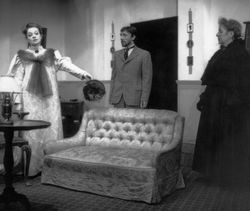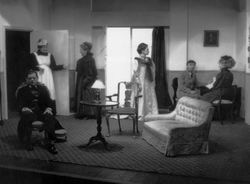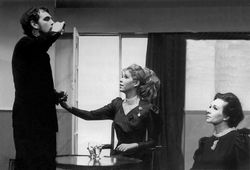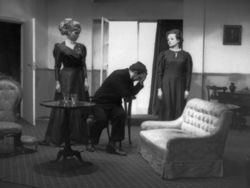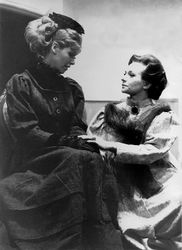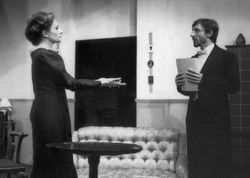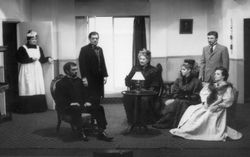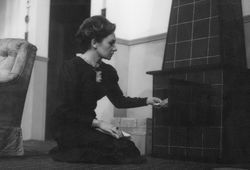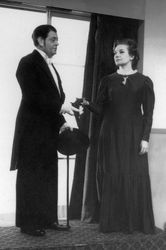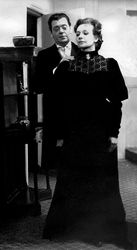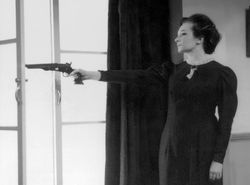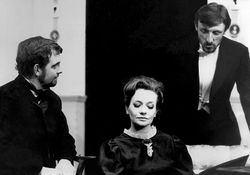Difference between revisions of "Hedda Gabler (1969)"
(→Introduction) |
(→Gallery) |
||
| (19 intermediate revisions by 5 users not shown) | |||
| Line 10: | Line 10: | ||
== Introduction == | == Introduction == | ||
| − | The action takes place in a villa in Kristiania (now Oslo). Hedda Gabler, daughter of an impoverished | + | The action takes place in a villa in Kristiania (now Oslo). Hedda Gabler, daughter of an impoverished general, has just returned from her honeymoon with George Tesman, an aspiring young academic — reliable, but not brilliant, who has combined research with their honeymoon. It becomes clear in the course of the play that she has never loved him, that she married him for economic security, and it is suggested she may be pregnant. The reappearance of George Tesman's academic rival, Eilert Løvborg, throws their lives into disarray. Løvborg, a writer, is also an alcoholic who has wasted his talent until now. Thanks to a relationship with Hedda's old schoolmate, Thea Elvsted (who has left her husband for him), he shows signs of rehabilitation, and has just completed what he considers to be his masterpiece. This means he now poses a threat to Tesman, as a competitor for the university professorship which Tesman had believed would be his. It became clear earlier that the couple are financially overstretched and Tesman now tells Hedda that he will not be able to afford to have her do a great deal of entertaining or to support her in a lavish lifestyle. |
Hedda, apparently jealous of Mrs. Elvsted's influence over Eilert, hopes to come between them. Tesman, returning home from a party, finds the manuscript of Eilert Løvborg's great work, which the latter has lost while drunk. When Hedda next sees Løvborg, he confesses to her, despairingly, that he has lost the manuscript. Instead of telling him that the manuscript has been found, Hedda encourages him to commit suicide, giving him a pistol. She then burns the manuscript. She tells her husband she has destroyed it to secure their future, so that he, not Løvborg, will become a professor. | Hedda, apparently jealous of Mrs. Elvsted's influence over Eilert, hopes to come between them. Tesman, returning home from a party, finds the manuscript of Eilert Løvborg's great work, which the latter has lost while drunk. When Hedda next sees Løvborg, he confesses to her, despairingly, that he has lost the manuscript. Instead of telling him that the manuscript has been found, Hedda encourages him to commit suicide, giving him a pistol. She then burns the manuscript. She tells her husband she has destroyed it to secure their future, so that he, not Løvborg, will become a professor. | ||
| Line 16: | Line 16: | ||
When the news comes that Løvborg has indeed killed himself, Tesman and Mrs. Elvsted are determined to try to reconstruct his book from what they already know. Hedda is shocked to discover, from the sinister Judge Brack, that Eilert's death, in a brothel, was messy and probably accidental (this is in huge contrast to the "beautiful" death that Hedda had imagined for him). Worse, Brack knows where the pistol came from. This means that he has power over her, which he will use to insinuate himself into the household (there is a strong implication that he will try to seduce Hedda). Leaving the others, she goes into her smaller room and shoots herself. | When the news comes that Løvborg has indeed killed himself, Tesman and Mrs. Elvsted are determined to try to reconstruct his book from what they already know. Hedda is shocked to discover, from the sinister Judge Brack, that Eilert's death, in a brothel, was messy and probably accidental (this is in huge contrast to the "beautiful" death that Hedda had imagined for him). Worse, Brack knows where the pistol came from. This means that he has power over her, which he will use to insinuate himself into the household (there is a strong implication that he will try to seduce Hedda). Leaving the others, she goes into her smaller room and shoots herself. | ||
| − | Hedda refuses to be referred to as Tesman as for her it | + | Hedda refuses to be referred to as Tesman as for her it symbolises imprisonment within the institution of marriage and society, whilst Gabler embodies freedom (Ibsen also uses the name Gabler as it makes her appear as more of her father's daughter as opposed to a husband's wife). In a way Ibsen’s play subtly explored issues of feminism as Hedda's main aim was to break free from the ideologies surrounding a patriarchal society. However, she became incarcerated by self-hate in her determination to achieve freedom of speech. |
| + | |||
| + | [http://en.wikipedia.org/wiki/Hedda_Gabler Wikipedia entry for Hedda Gabler] | ||
== Cast == | == Cast == | ||
| − | * | + | *George Tesman - [[Eric Smith]] |
| − | * Hedda Tesman (née Gabler) - [[Ruth Lidyard|Ruth Shettle]] | + | *Hedda Tesman (née Gabler) - [[Ruth Lidyard|Ruth Shettle]] |
| − | * Miss | + | *Miss Juliana Tesman - [[Rose Leaf]] |
| − | * | + | *Judge Brack - [[Leslie Lidyard]] |
| − | * | + | *Eilert Løvborg - [[Brian Fletcher]] |
| − | * | + | *Bertha - [[Anne Rumsey]] |
| − | * | + | *Thea Elvstead - [[Averil Cookman]] |
== Crew == | == Crew == | ||
| − | *Stage Manager - [[ | + | *Stage Manager - [[Ray Seaton]] |
| − | * | + | *Assisted by - [[Christine Rothin]], [[Valerie Westbey]], [[Charles Cheetham]] & [[Maggie Burrows]] |
| − | *Lighting | + | *Lighting - [[Ken Evans]] |
| + | *Sound - [[Ricky Maguire]] | ||
| + | *Set Designed by - [[James Morgan]] | ||
| + | *Set Construction - [[Ray Seaton]] | ||
| + | *Costumes - [[Jean Firminger]] | ||
| + | *Assistant to the director - [[Jimmy Cripps]] | ||
| + | *F.O.H. Manager - [[Frank Howcutt]] | ||
| + | *Box-office Manager - [[Ralph Wade]] | ||
== Reviews == | == Reviews == | ||
| Line 40: | Line 49: | ||
== Gallery == | == Gallery == | ||
| + | <gallery widths="250px" heights="250px" perrow="5"> | ||
| − | + | Image:Hedda008.jpg | |
| + | Image:Hedda012.jpg | ||
| + | Image:HG001.jpg | ||
| + | Image:Hedda019.jpg | ||
| + | Image:HG002.jpg|[[]] & [[Ruth Shettle]] | ||
| + | Image:Hedda023.jpg|[[Ruth Shettle]] & [[Eric Smith]] | ||
| + | Image:Hedda028.jpg | ||
| + | Image:Hedda030.jpg|[[Ruth Shettle]] | ||
| + | Image:Hedda022.jpg|[[Leslie Lidyard]] & [[Ruth Shettle]] | ||
| + | Image:HG004.jpg|[[Leslie Lidyard]] & [[Ruth Shettle]] | ||
| + | Image:Hedda052.jpg|[[Ruth Shettle]] | ||
| + | Image:HG003.jpg | ||
| + | </gallery> | ||
== Reminiscences and Anecdotes == | == Reminiscences and Anecdotes == | ||
Latest revision as of 14:55, 8 May 2016

by Henrik Ibsen Translated by Michael Meyer
Directed by Eileen Pasco
Performances: Sat 2nd - Sun 8th February 1969, Theatre
Contents
Introduction
The action takes place in a villa in Kristiania (now Oslo). Hedda Gabler, daughter of an impoverished general, has just returned from her honeymoon with George Tesman, an aspiring young academic — reliable, but not brilliant, who has combined research with their honeymoon. It becomes clear in the course of the play that she has never loved him, that she married him for economic security, and it is suggested she may be pregnant. The reappearance of George Tesman's academic rival, Eilert Løvborg, throws their lives into disarray. Løvborg, a writer, is also an alcoholic who has wasted his talent until now. Thanks to a relationship with Hedda's old schoolmate, Thea Elvsted (who has left her husband for him), he shows signs of rehabilitation, and has just completed what he considers to be his masterpiece. This means he now poses a threat to Tesman, as a competitor for the university professorship which Tesman had believed would be his. It became clear earlier that the couple are financially overstretched and Tesman now tells Hedda that he will not be able to afford to have her do a great deal of entertaining or to support her in a lavish lifestyle.
Hedda, apparently jealous of Mrs. Elvsted's influence over Eilert, hopes to come between them. Tesman, returning home from a party, finds the manuscript of Eilert Løvborg's great work, which the latter has lost while drunk. When Hedda next sees Løvborg, he confesses to her, despairingly, that he has lost the manuscript. Instead of telling him that the manuscript has been found, Hedda encourages him to commit suicide, giving him a pistol. She then burns the manuscript. She tells her husband she has destroyed it to secure their future, so that he, not Løvborg, will become a professor.
When the news comes that Løvborg has indeed killed himself, Tesman and Mrs. Elvsted are determined to try to reconstruct his book from what they already know. Hedda is shocked to discover, from the sinister Judge Brack, that Eilert's death, in a brothel, was messy and probably accidental (this is in huge contrast to the "beautiful" death that Hedda had imagined for him). Worse, Brack knows where the pistol came from. This means that he has power over her, which he will use to insinuate himself into the household (there is a strong implication that he will try to seduce Hedda). Leaving the others, she goes into her smaller room and shoots herself.
Hedda refuses to be referred to as Tesman as for her it symbolises imprisonment within the institution of marriage and society, whilst Gabler embodies freedom (Ibsen also uses the name Gabler as it makes her appear as more of her father's daughter as opposed to a husband's wife). In a way Ibsen’s play subtly explored issues of feminism as Hedda's main aim was to break free from the ideologies surrounding a patriarchal society. However, she became incarcerated by self-hate in her determination to achieve freedom of speech.
Wikipedia entry for Hedda Gabler
Cast
- George Tesman - Eric Smith
- Hedda Tesman (née Gabler) - Ruth Shettle
- Miss Juliana Tesman - Rose Leaf
- Judge Brack - Leslie Lidyard
- Eilert Løvborg - Brian Fletcher
- Bertha - Anne Rumsey
- Thea Elvstead - Averil Cookman
Crew
- Stage Manager - Ray Seaton
- Assisted by - Christine Rothin, Valerie Westbey, Charles Cheetham & Maggie Burrows
- Lighting - Ken Evans
- Sound - Ricky Maguire
- Set Designed by - James Morgan
- Set Construction - Ray Seaton
- Costumes - Jean Firminger
- Assistant to the director - Jimmy Cripps
- F.O.H. Manager - Frank Howcutt
- Box-office Manager - Ralph Wade
Reviews
Some review quotes go here
Gallery
[[]] & Ruth Shettle
Reminiscences and Anecdotes
Members are encouraged to write about their experiences of working on or seeing this production. Please leave your name. Anonymous entries may be deleted.
See Also
References
<references/>
